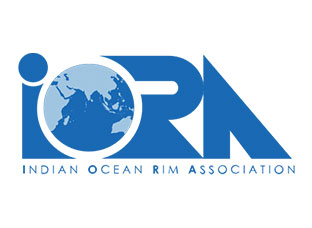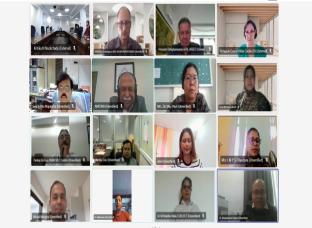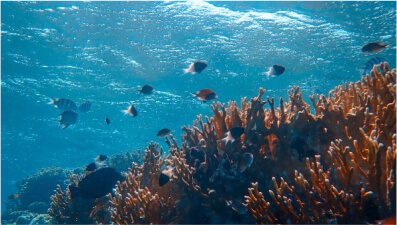IORAG envisions a future where enhanced dialogue, research, exchange, and networking across all priority and cross-cutting areas of the IORA, significantly strengthens academic collaboration.
Recent efforts have aimed to reinvigorate the Academic Group and solidify its impact. Building upon initiatives begun during Australia's chairmanship, South Africa formally proposed institutional reform in 2017, seeking to establish a more dynamic link between policy and projects across IORA bodies. This emphasis on collaboration was further reinforced by the 2018 revision of the IORA Charter, which requires all Functional Bodies, including IORAG, to operate under formally established Modalities and Terms of Reference (TOR). These TORs are recommended by the Committee of Senior Officials (CSO) and approved by the Council of Ministers (COM). As of today, the Islamic Republic of Iran holds the esteemed position of IORAG Chair, across IORA's priority and cross-cutting areas.
IORAG's purpose is to advance IORA's efforts by aligning with, and potentially extending beyond, the goals outlined in IORA Action Plans. Its advisory and catalytic role is guided by the following key objectives:
- Promote intellectual dialogue: This objective emphasises fostering open exchange of ideas and perspectives amongst member states.
- Disseminate knowledge: IORAG aims to develop and share knowledge related to the Indian Ocean Rim, including the "Indian Ocean Rim Concept" and relevant research.
- Support IORA institutions: Through rigorous research, IORAG assists both Primary Bodies (Council of Ministers, Committee of Senior Officials, Secretariat) and Functional Bodies (Working Groups, Sub-Working Groups, Sectoral/Cluster/Core Groups, Dialogue Forums) within IORA.
- Provide evaluation and advisory services: IORAG offers evaluations and advice on academic activities within IORA, including assessments of proposed IORA Academic Centres of Excellence based on established Key Performance Indicators.
- Coordinate and evaluate research: IORAG plays a central role in coordinating and evaluating academic research generated across IORA and its various mechanisms.
- Support evidence-based decision-making: IORAG aims to facilitate research-based policy and decision-making by disseminating research findings through IORA journals and the IORA website.
- Promote academic collaboration: IORAG encourages national and regional networks and cooperation amongst training institutions, universities, and other specialised institutions across member states to foster human resource development and exchange.
- Strengthen regional analysis and collaboration: IORAG works to strengthen both political analysis and scientific research collaboration within the region.
- Disseminate knowledge for sustainable development: IORAG facilitates the sharing of knowledge and innovation to drive economic growth and environmental sustainability, encompassing both the creative economy and the "blue economy."
- Catalyse regional discussions: IORAG organises the "Indian Ocean Dialogue" (annually or biennially) to stimulate discussions on issues of regional importance.
- Develop a network of Think Tanks: IORAG strives to establish a network of Think Tanks across IORA member states.
To achieve this, the 18th Meeting of Council of Ministers of IORA held on 2 November 2018 in Durban, South Africa proposed an Expert Group Meeting and, aligning with the 2017 Jakarta Concord objectives and IORA Action Plan (2017-2021), the establishment of a dedicated Working Group on Science, Technology, and Innovation (WGSTI).
The WGSTI aspires to:
- Build a common sustainable development agenda through knowledge sharing, best practice exchange, and capacity building initiatives.
- Strengthen academic, scientific, and technological cooperation among IORA member states through project-based approaches that foster developmental partnerships.
- Facilitate collaboration between policymakers by creating a common platform for them to collaborate on the implementation of an agreed Work Plan, fostering cooperation in science, technology, and innovation across member states.
Build a collaborative framework within IORA, taking into account the specific needs and priorities of member states alongside the association's collective vision.
This framework aims to achieve various goals, including:
- Shared Understanding: Foster a common understanding among member states regarding the necessity of collating existing scientific, technological, and innovation expertise across various levels - and assessing this expertise to identify potential opportunities within the Indian Ocean region.
- Developmental Cooperation: Encourage developmental cooperation among member states with regard to Science, Technology, and Innovation (STI). This may involve collaboration with Dialogue Partners and other relevant stakeholders as necessary.
- Facilitate Consultation and Coordination: Define structures and processes to facilitate practical consultation and coordination among member states on STI matters.
- Enhanced Collaboration within the Region: Promote and improve effective coordination, consultation, and complementarity with existing mechanisms in the region. This includes cooperation with other IORA Working Groups and other relevant entities beyond the region.
South Africa is the current WGSTI Chair.



